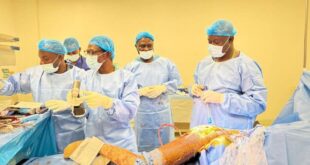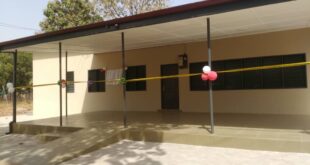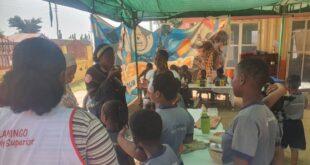 Tamale, Ghana – Actors in the electronics waste and scrap business in the Northern Region of Ghana have been trained on how to formalize their activities as part of plans by development partners to help government tackle electronic waste management challenges across the country.
Tamale, Ghana – Actors in the electronics waste and scrap business in the Northern Region of Ghana have been trained on how to formalize their activities as part of plans by development partners to help government tackle electronic waste management challenges across the country.
The initiative, under the Electronic Waste Management (E-MAGIN) project being spearheaded by a consortium of four institutions including the University of Cape Coast, seeks to sensitise all electronics waste and scrap dealers to conduct their businesses in an environmentally friendly manner.
Funded by the European Union, the 48-month project would on a yearly basis provide training to members of the Northern Scrap Dealers Association; Ghana Electronics Servicing and Technicians Association; and the National Air-condition and Refrigeration Workshop Owners Association (NARWOA) on ideas that would help them to grow their business and also guard themselves against health hazards associated with their business.
 The Tamale workshop on Monday September 30 and Tuesday October 1, 2019 dubbed “Formalization Workshop for MSMES in the E-Waste Sector in Ghana”, sought to educate executive members of the aforementioned associations on some laws governing the licensing of businesses in the electronic waste (e-waste) sector.
The Tamale workshop on Monday September 30 and Tuesday October 1, 2019 dubbed “Formalization Workshop for MSMES in the E-Waste Sector in Ghana”, sought to educate executive members of the aforementioned associations on some laws governing the licensing of businesses in the electronic waste (e-waste) sector.
The workshop also sought to educate the participants on the rational for formalizaing Small and Micro-Enterprises in the electronic waste sector with the Environmental Protection Agency, and the processes and requirements needed for the formalization of such businesses using practical exercises including filling of required sample forms from the EPA.
A lead trainer on the E-MAGIN project and lecturer at the University of Cape Coast, Professor Daniel Agyapong, said the project seeks to identify ways by which e-waste could be discarded in a sound and environmentally friendly way.
 He noted that, every e-waste posed hazardous to human health and the natural environment, and the wrongful disposal of them could lead to water, air, land and or food pollution.
He noted that, every e-waste posed hazardous to human health and the natural environment, and the wrongful disposal of them could lead to water, air, land and or food pollution.
“Electrical equipment of different forms contains a lot of poisonous gases including mercury and what have you. And so what happens is that, once they are not properly kept especially in most electronic repairing shops where they sometimes leave some spoiled television sets in the open. When it rains, the chemicals in them are washed away into our gutters and our gutters eventually end up in our rivers. The chemicals will pollute the fishes in the river and when you eat these fishes you’ll get sick.
“No matter how you purify water from those rivers polluted by the chemicals they’ll still be polluted and as you drink from them a time will come you’ll get sick. Also burning of these e-waste without wearing the prescribed protective clothes exposes you to danger and if you’re a man a time will come you’ll not be able to function well”, Prof. Agyapong pointed out.
 Prof. Agyapong urged all electronic repairers, scrap dealers and dealers of electronic gadgets to join the associations so that they could benefit from future training programmes as well as receive recognition from the state in order to be able to do their business.
Prof. Agyapong urged all electronic repairers, scrap dealers and dealers of electronic gadgets to join the associations so that they could benefit from future training programmes as well as receive recognition from the state in order to be able to do their business.
By SavannahNewsOnline.Com/Philip Liebs
 Savannah News Online Reporting Only What Matters Most
Savannah News Online Reporting Only What Matters Most



